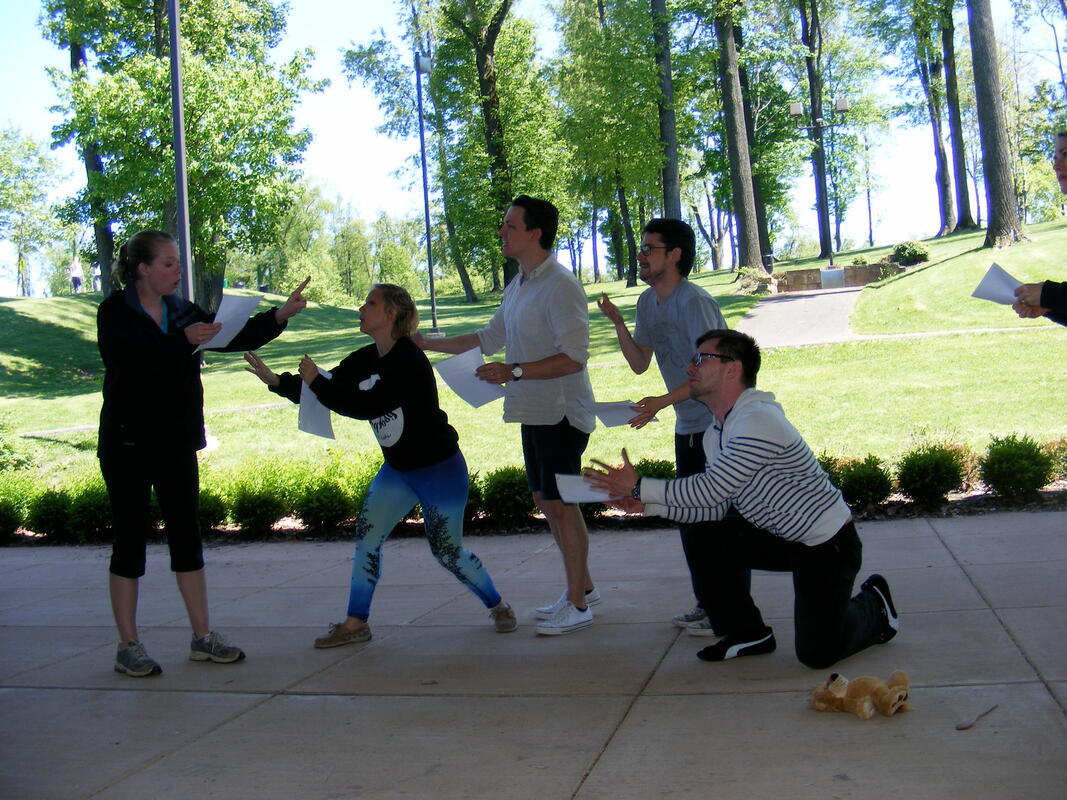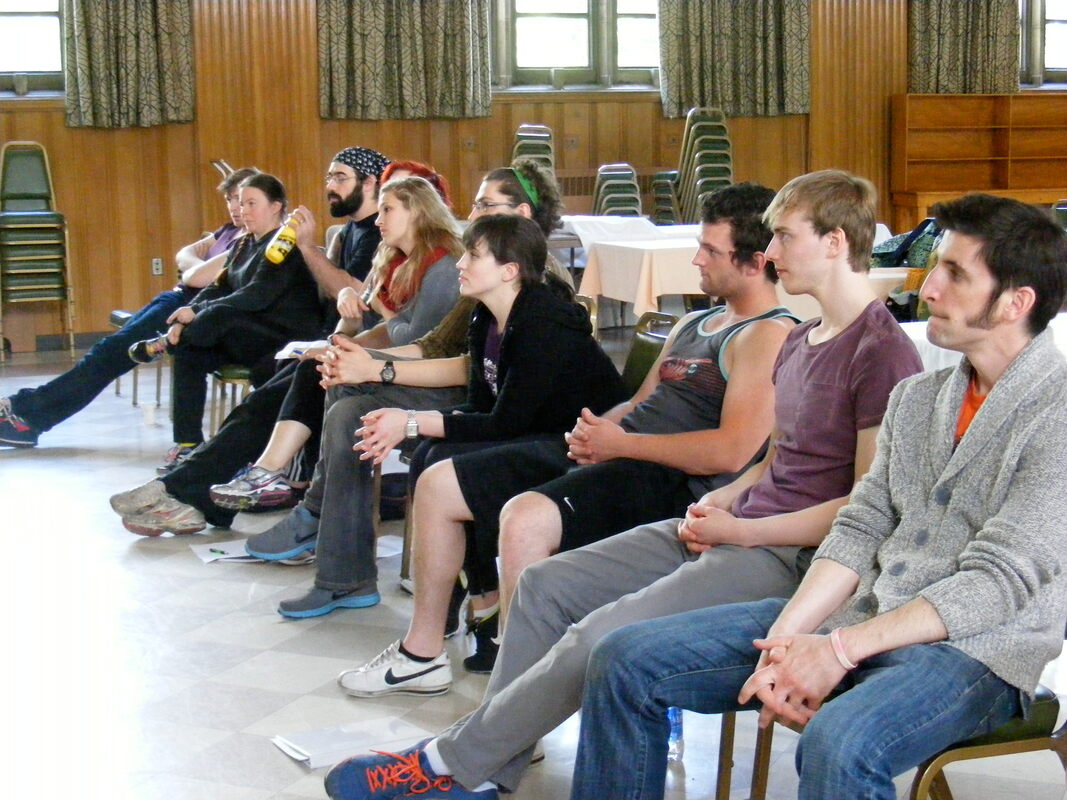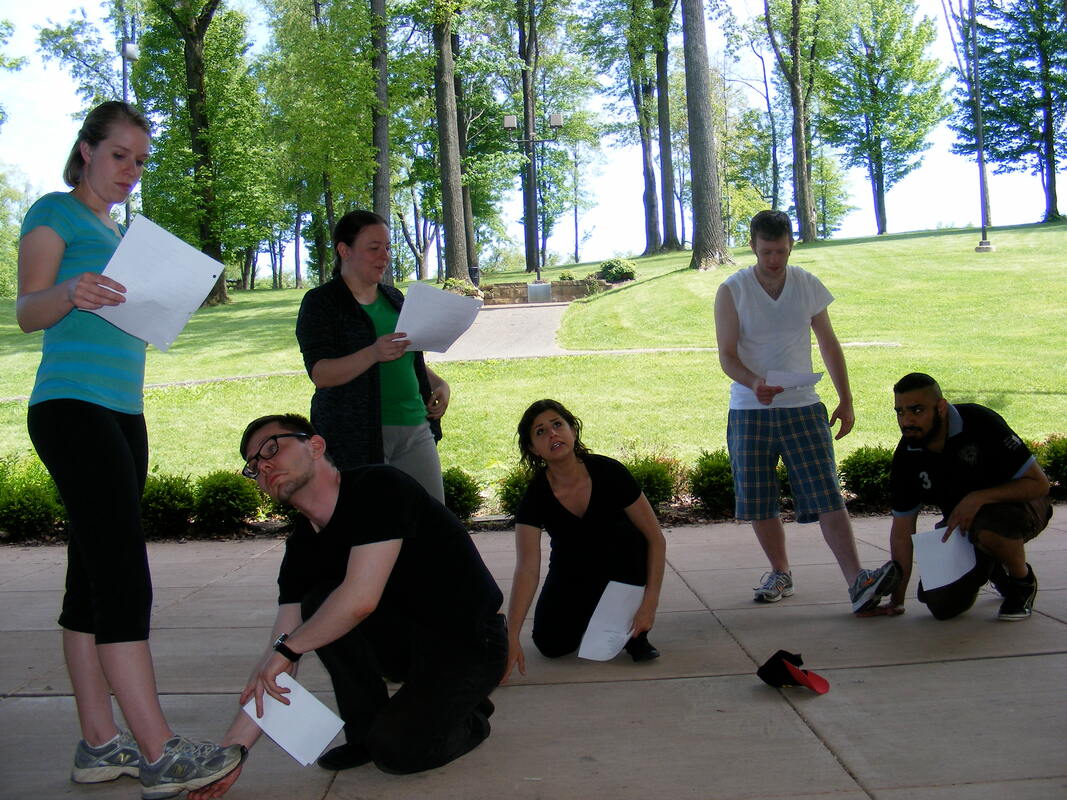The mission of The Unrehearsed Shakespeare Project is to perform the works of William Shakespeare using the Unrehearsed Cue Script Technique in order to expose our community to unique productions that bring the audience and performers together in a way that only theatre can. We teach actors to find cues and clues that Shakespeare put into his scripts enabling them to make the plays the entertainments the playwright intended. We tell the stories. You interpret them.
The Unrehearsed Cue Script Technique

When Shakespeare’s company performed, they did so in the open air, under natural light in an environment fraught with distractions. Gambling, drinking, bear baiting and prostitution were available only feet away from the performance, if not in the theatres and inn yards of the time. This meant that performances had to be entertaining and fast-paced to keep the audience interested and to entice them to come and spend their money again. For this reason, the same play was not repeated every day for a long run as is common today. Shakespeare’s company presented a different play every day of the week (Sundays excluded) and never presented the same play more than twice in two weeks. So when did the company have time to rehearse? Short answer: They didn’t.
The daylight hours before the performances were spent going over any fights, dances and music included in the afternoon’s performance. The plays went on while the sun was up. Once the moon came out the company retired into the bars (not much has changed since). Given the time restraints, there was no time to rehearse in the manner that we understand it today
The daylight hours before the performances were spent going over any fights, dances and music included in the afternoon’s performance. The plays went on while the sun was up. Once the moon came out the company retired into the bars (not much has changed since). Given the time restraints, there was no time to rehearse in the manner that we understand it today
|
Actors were also not given the full text of a script. There were no copyright laws, and nothing kept an actor, unhappy with his role, from taking his copy of Hamlet to a competing theatre and selling it as his own creation. Also, Shakespeare had enough work writing Hamlet out completely in longhand once. When would there be time to create a script for every actor in the company? Ink and paper were expensive. To save money, time and energy and to keep the scripts secure actors were only given scrolls –or rolls (the origin of an actor’s ‘role’)- that contained the last few words of their cues, their own lines, entrances, exits and only essential stage directions that could not be conveyed through the lines of the other actors.
|

How did the actors know what to do on stage if there were no rehearsals and they had no access to the full script? Playwrights of the time understood the environment and constraints of commercial theatre and wrote clues to the characters and stage directions into the text of a script. The spelling, the punctuation, the language and the meter all contain cues for the actors that they would give and receive in the moment on stage. The words the characters used gave the actors clues as to how they should be portrayed. Everything an actor needs to know about how to perform a role is right there in his cue script.
The Unrehearsed Cue Script Technique teaches actors how to mine the First Folio of Shakespeare’s work for these clues that the playwright himself left. The technique exposes humor and tragedy throughout all of his works, draws themes from the scripts rather than placing arbitrary themes upon them and creates spontaneous moments between the actors and with the crowd in every performance. It takes Shakespeare off the pedestal of academia and plants his feet firmly with the groundlings, while letting his head soar in the clouds, and allows the audience to do the same.
The Unrehearsed Cue Script Technique teaches actors how to mine the First Folio of Shakespeare’s work for these clues that the playwright himself left. The technique exposes humor and tragedy throughout all of his works, draws themes from the scripts rather than placing arbitrary themes upon them and creates spontaneous moments between the actors and with the crowd in every performance. It takes Shakespeare off the pedestal of academia and plants his feet firmly with the groundlings, while letting his head soar in the clouds, and allows the audience to do the same.
Workshops
We teach workshops demonstrating the use of the Unrehearsed Cue Script Technique. At the core of the work are 'The Ten Commandments of Staging and Blocking Shakespeare,' developed by Demitra Papadinis. All workshops are taught by Andy Kirtland and include an explanation of the environment in which Shakespeare worked, why he wrote the way he did and participants get on their feet to engage with the text in a practical manner. In-class workshops can be tailored to fit into any class period or any specific play your students may be studying. For schools and universities the price for our workshops start at $500. Prices can be negotiated for smaller organizations. Contact us to start the conversation of bringing a workshop to you!
|
ACTION TO THE WORD:
A two-hour workshop that focuses on two of the most fundamental rules of the Unrehearsed Cue Script Technique when performing scenes and working on characters. |
UNREHEARSED PLAYBOOK:
A full day workshop is six hours (plus breaks) and explores the rules of staging and blocking Shakespeare. Participants experience how poetic devices, grammar, spelling and punctuation help define characters and give actors clues to perform their roles. |
UNREHEARSED INTENSIVE:
A two-day workshop gives the participants an in depth experience of the Unrehearsed Cue Script Technique. After intensive scene work with THE UNREHEARSED PLAYBOOK and close readings of the text as they relate to the action on stage, the participants will perform either scenes or an abridged play (depending on the number of participants) for an invited audience. |
Prompt Books and Cue Scripts
We have Prompt Books and Cue Scripts available to individuals and companies who want to become better acquainted with this way of working. These are great for actors looking for a new way to approach a character, to use as a teaching aid, or to use as a production tool. We recommend taking an Unrehearsed workshop in order to gain a better understanding of the cue scripts and how to use them.
Our packages include a Prompt Book, Cue Scripts for all characters, instructions on how to put cue scripts together and notes on any variations between the Prompt Book and Cue Scripts. Prices start at $150 for a package Additional editing, cutting or doubling will be extra. Contact us to discuss your needs. Currently available are: As You Like It, The Comedy of Errors, Henry IV Part I, Julius Caesar, Macbeth, A Midsummer Night's Dream, Much Ado About Nothing, Romeo and Juliet, The Tempest and The Two Gentlemen of Verona. We will continue to add to the list, and will also take requests.
To order, please contact us at: USP@newrentheatre.com
Our packages include a Prompt Book, Cue Scripts for all characters, instructions on how to put cue scripts together and notes on any variations between the Prompt Book and Cue Scripts. Prices start at $150 for a package Additional editing, cutting or doubling will be extra. Contact us to discuss your needs. Currently available are: As You Like It, The Comedy of Errors, Henry IV Part I, Julius Caesar, Macbeth, A Midsummer Night's Dream, Much Ado About Nothing, Romeo and Juliet, The Tempest and The Two Gentlemen of Verona. We will continue to add to the list, and will also take requests.
To order, please contact us at: USP@newrentheatre.com
"As veteran unrehearsed cue-script performers, Andy Kirtland and Elizabeth Ruelas are passionate and adept at making Shakespeare's First Folio text come alive. By using original performance techniques, 'Unrehearsed Shakespeare Project' workshops and performances illuminate Shakespeare's works in exciting and unexpected new ways."
---Demitra Papadinis (Teacher and Director of the Unrehearsed Cue Script Technique for over 20 years, Founder and Producing Artistic Director of The New England Shakespeare Festival, and Author of Frankly Annotated First Folio Editions of Shakespeare's Plays)





